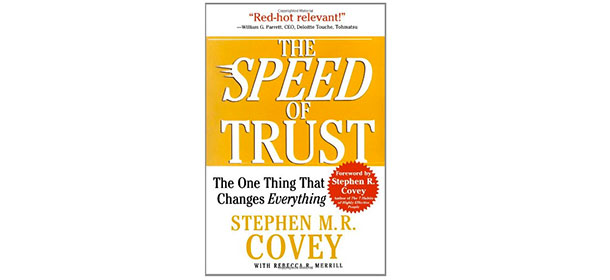If you think about it, it’s pretty obvious: Trust is everything. Without it, your marriage cannot stand. Business partnerships wither and die. Customers flee.
Stephen M.R. Covey, wrote a fantastic book, The SPEED of Trust: The One Thing That Changes Everything, that is simply a must-read for any successful business owner or entrepreneur.
Mr. Covey’s thesis is simple, but profound: Trust impacts speed and cost in everything. More trust begets faster and cheaper results, and conversely, less trust begets slower and more expensive results. A lack of trust is like a tax on everything you do.
Why is Trust so Important?
Trust decreases costs and speeds things up. A lack of trust has the opposite effect.
The book is replete with examples, but I’ll give you two. First, consider two children: Cindy is always true to her word, never gets into trouble, and consistently exercises good judgement. Timmy is the opposite. Who are you more likely to trust? Because you have a greater degree of trust for Cindy over Timmy, are you more likely to give Cindy privileges? Are you more likely to let Cindy try something new? Conversely, if you must rely on Timmy, are you going to spend more time making sure Timmy understands exactly what is expected of him? Are you going to worry or fret over whether Timmy is doing what you asked of him?
Another example is to consider two generally trustworthy individuals: A brain surgeon and a bricklayer. Both are great at their jobs. Both are outstanding, model citizens in their community. Trust is never an issue with these two. Or, is it? Would you trust the bricklayer to conduct brain surgery? Likewise, would you trust the brain surgeon to build you a new brick house?
Trust is a complex function of perception, credibility, capability, consistency and reputation. A failure to exceed in any one of these areas erodes trust, acting as molasses to accomplish your goals and objectives.
There are different forms of Trust
Mr. Covey writes about five different waves of trust: self, relationship, organizational, market, and societal. All five deal with different situations, but all depend on each other.
The book outlines “waves” or spheres of trust: The first is “self trust,” or the confidence we have in ourselves to accomplish what we set out to do, with credibility being the key concept of this wave. The second wave is “relationship trust,” where consistent behavior helps increase a “trust account” we maintain in our relationships, whether friends, loved ones, coworkers, bosses or other leaders. The third wave is “organizational trust,” which deals with the level of trust maintained at an organizational level, and alignment is the key concept here. The fourth wave is “market trust,” where reputation is everything. Finally, the fifth wave is “societal trust,” where contribution represents the underlying principle.
What’s so incredible, is that all the waves are intertwined and interdependent upon one another. If you cannot trust yourself and maintain credibility, how can you expect to maintain a level of trust (and respect) in your personal relationships? Likewise, if you cannot maintain a level of trust in your personal relationships, how can you possibly be expected to lead an organization and have your customers and employees have faith and trust in the company?
Trust is a Key Factor in Business
Building trust takes time to build a reputation, while destroying trust can happen overnight.
Trust is earned, not deserved. Everyone will grant an initial trial of trust to get to learn to know someone or a business. Trust is built-up over time, and can come crashing down in a blink of an eye. The stronger the ties or relationship to someone, such as a parent/child relationship, the more resilient the relationship to even significant breeches in trust. Conversely, the weaker the ties, such as a business/customer relationship, the greater the chance of irreparable harm and complete destruction of the relationship in even modest breeches in trust.
As a law firm and group of small business attorneys, trust is critical. Our clients demand that we have the competence to deal with their problems. They must trust our ability to bill and charge fairly, as well as deliver work product on time and when we say we will. Without doing these things consistently, and contritely admitting and apologizing for our failures, this law firm would be out of business soon.
Interestingly, a significant portion of our revenue stream derives from breaches in trust: Once former partners and friends become embittered enemies, causing disputes, litigation and more. Similarly, I see all too often great businesses fail, simply because the business owner doesn’t understand the nuances of trust, and how the failure to maintain trust erodes the long-term credibility and reputation of their business, slowing its effectiveness to close deals, bring in new customers, and keep existing customers.
See our recent blog article, Rogue Business Partners, for an example of the issues that can develop when trust breaks down between partners. Establishing and maintaining trust, for both you and your partner(s) takes hard work and diligence.
The BizJournal.com has a good article called Why Trust is so Important to a Business, that provides some good examples of how to build and maintain trust in a business.
How to Improve Trust in Business
Unfortunately for us business leaders, the Internet — through the reviews and ratings made possible with Yelp, Google, Facebook, BBB and others — really impacts the trust quotient for our businesses, by impacting our reputations and giving a voice to those who have an opinion about our businesses. You can bet that breaching a customer’s trust is a factor in every negative review.
Do you have a trust issue? Could your business improve with greater trust?
- Does your business do what it says it will do?
- Do you consistently meet the promise of price, performance, time and quality?
- Do you consistently meet your customers’ expectations?
- Does your brand promise align with your business fulfillment?
- Is it easy to obtain new customers?
- Do you easily keep existing customers?
- Do your customers accept your word, without asking lots of questions?
If you cannot answer “yes” to all the above questions, you may have a trust issue in your business. Read the book.
For more information on building trust, read Forbes article, The Essential Importance Of Trust: How To Build It Or Restore It.
If all business owners and entrepreneurs read Mr. Covey’s book, this firm’s revenue would take a big hit. Cash is king, but without trust, cash is hard to come by.
Law 4 Small Business (L4SB), a little law now can save a lot later. A Slingshot company.




